The global transport cases & boxes market is projected to grow from USD 8.4 billion in 2025 to approximately USD 22.8 billion by 2035, recording an absolute increase of USD 14.4 billion over the forecast period. This translates into a total growth of 171.4%, with the market forecast to expand at a CAGR of 10.5% between 2025 and 2035. The market size is expected to grow by approximately 2.7X during the same period, supported by increasing demand for secure equipment transportation, growing adoption across professional industries, and rising requirements for protective packaging solutions across global logistics and industrial sectors.
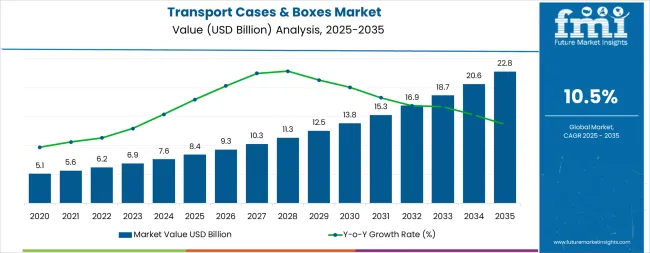
Between 2025 and 2030, the transport cases & boxes market is projected to grow from USD 8.4 billion to USD 13.9 billion, adding USD 5.5 billion, or 38.2% of the total decade growth. This will be driven by rising demand for professional-grade protective solutions, increased equipment value, and the availability of specialized cases across industrial sectors. From 2030 to 2035, the market is forecast to expand from USD 13.9 billion to USD 22.8 billion, adding USD 8.9 billion, or 61.8% of the decade’s growth. Key drivers will include lightweight composite materials, advanced protection technologies, and customizable solutions. Focus on equipment safety, impact resistance, moisture protection, and durability will fuel demand. Between 2020 and 2024, the market grew due to increased awareness of equipment protection and the effectiveness of transport cases in ensuring safe transportation.
| Metric | Value |
|---|---|
| Estimated Value in (2025E) | USD 8.4 billion |
| Forecast Value in (2035F) | USD 22.8 billion |
| Forecast CAGR (2025 to 2035) | 10.5% |
The packaging industry is the largest contributor, accounting for around 40-45%. Transport cases and boxes are widely used to safeguard products across various sectors, including electronics, automotive, pharmaceuticals, and consumer goods. These protective solutions ensure that products remain secure and undamaged during transit, reducing the risk of product loss or damage. Transport cases, often made from high-strength materials such as plastic, metal, or composite materials, provide superior protection for valuable, fragile, and sensitive products. The logistics and supply chain market, contributing approximately 25-30%, also plays a crucial role in driving the demand for transport cases and boxes. The need for reliable, secure, and efficient transportation solutions across industries such as e-commerce, retail, and manufacturing drives growth in this market.
The electronics market, accounting for around 15-20%, also contributes significantly to the demand for transport cases and boxes, as electronic components and devices require specialized packaging to prevent damage from environmental factors like moisture, heat, and vibrations. The pharmaceutical market, holding about 10-12%, utilizes transport cases and boxes for the safe and compliant transportation of temperature-sensitive medicines and medical devices. The automotive market, with a share of approximately 5-8%, relies on transport cases and boxes to protect car parts and components during shipping.
Market expansion is being supported by the increasing global demand for equipment protection solutions and the corresponding shift toward professional-grade packaging that can provide superior protective outcomes while meeting user requirements for safety assurance and reliable transportation processes. Modern professionals are increasingly focused on incorporating protective solutions that can enhance equipment longevity while satisfying demands for durable, consistently performing packaging and optimized handling practices. Transport cases' proven ability to deliver protection benefits, equipment safety, and diverse application possibilities makes them essential products for equipment-intensive professionals and quality-conscious organizations.
The growing emphasis on equipment preservation and operational efficiency is driving demand for high-quality transport cases that can support distinctive protection outcomes and comprehensive safety positioning across electronics transport, instrument protection, and specialty equipment categories. User preference for products that combine protective excellence with durability characteristics is creating opportunities for innovative implementations in both traditional and emerging transportation applications. The rising influence of professional standards and equipment protection initiatives is also contributing to increased adoption of transport cases that can provide authentic safety benefits and reliability characteristics.
The market is segmented by product type, material type, end-use industry, and region. By product type, the market is divided into hard cases, soft cases, rack mount cases, equipment cases, tool cases, camera cases, and other transport cases. Based on material type, the market is categorized into plastic, aluminum, and composite materials. By end-use industry, the market includes military & defense, aerospace, medical, photography & videography, industrial, and other industries. Regionally, the market is divided into North America, Europe, Asia Pacific, Latin America, Middle East & Africa, and other regions.
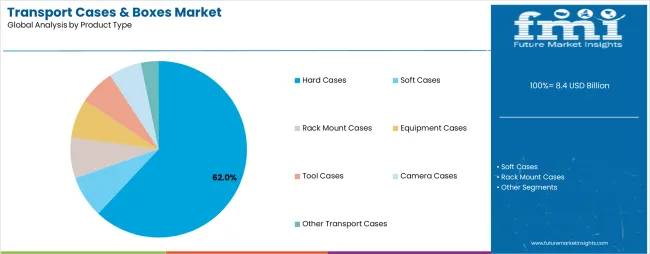
The hard cases segment is projected to account for 62% of the transport cases & boxes market in 2025, reaffirming its position as the leading product category. Professionals and organizations increasingly utilize hard cases for their superior protective characteristics, established impact resistance, and essential functionality in equipment protection applications across diverse transportation categories. Hard cases' standardized durability characteristics and proven protective effectiveness directly address user requirements for reliable equipment safety and optimal protection value in professional applications.
This product segment forms the foundation of modern transport protection patterns, as it represents the format with the greatest professional acceptance potential and established compatibility across multiple equipment systems. Professional investments in equipment protection optimization and safety standardization continue to strengthen adoption among quality-conscious organizations. With users prioritizing equipment security and protection reliability, hard cases align with both safety objectives and performance requirements, making them the central component of comprehensive equipment transportation strategies.
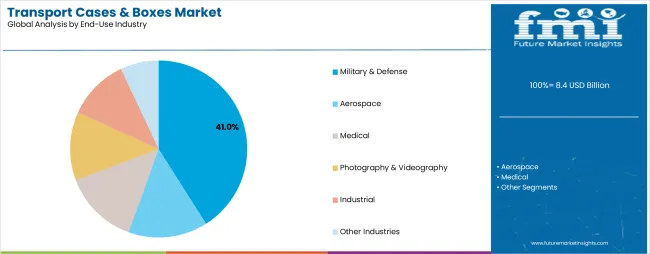
Aluminum cases are projected to represent 41% of the transport cases & boxes market growth through 2035, underscoring their critical role as the primary choice for quality-focused professionals seeking superior protective benefits and enhanced durability credentials. Professional users and premium equipment handlers prefer aluminum cases for their enhanced strength standards, proven lightweight superiority, and ability to maintain exceptional protective profiles while supporting long-term usage during high-value transportation experiences. Positioned as essential products for discerning professionals, aluminum offerings provide both protective excellence and durability advantages.
The segment is supported by continuous improvement in aluminum fabrication technology and the widespread availability of established manufacturing infrastructure that enables quality assurance and premium positioning at the professional level. Case manufacturers are optimizing aluminum processing methods to support market differentiation and accessible premium pricing. As materials technology continues to advance and users seek superior protection solutions, aluminum cases will continue to drive market growth while supporting equipment preservation and professional handling strategies.
The transport cases & boxes market is advancing rapidly due to increasing equipment protection consciousness and growing need for professional-grade packaging choices that emphasize superior protective outcomes across professional segments and transportation applications. The market faces challenges, including higher manufacturing costs, weight considerations for portable applications, and supply chain complexities affecting pricing stability. Innovation in lightweight materials and specialized product development continues to influence market development and expansion patterns.
The growing adoption of transport cases in specialized professional programs and equipment-intensive applications is enabling users to develop transportation patterns that provide distinctive protection benefits while commanding premium positioning and enhanced safety characteristics. Professional applications provide superior protective density while allowing more sophisticated equipment handling across various industrial categories. Users are increasingly recognizing the competitive advantages of transport case positioning for premium equipment protection and safety-conscious operational integration.
Modern transport case manufacturers are incorporating advanced engineering systems, customization technologies, and quality management protocols to enhance protective capabilities, improve user outcomes, and meet professional demands for equipment-specific protection solutions. These systems improve case effectiveness while enabling new applications, including integrated monitoring and specialized configuration programs. Advanced customization integration also allows manufacturers to support premium market positioning and protection leadership beyond traditional packaging operations.
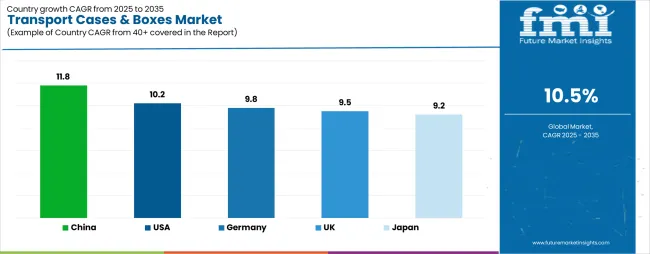
| Country | CAGR (2025-2035) |
|---|---|
| USA | 10.2% |
| Germany | 9.8% |
| UK | 9.5% |
| China | 11.8% |
| Japan | 9.2% |
The transport cases & boxes market is experiencing robust growth globally, with China leading at an 11.8% CAGR through 2035, driven by the expanding manufacturing sector, growing industrial sophistication, and increasing adoption of professional equipment protection products. The USA follows at 10.2%, supported by rising professional equipment usage, expanding logistics infrastructure, and growing acceptance of protective packaging solutions. Germany shows growth at 9.8%, emphasizing established industrial markets and comprehensive manufacturing development. The UK records 9.5%, focusing on premium protective products and professional equipment expansion. Japan demonstrates 9.2% growth, prioritizing quality transport solutions and technological advancement.
The report covers an in-depth analysis of 40+ countries, with top-performing countries highlighted below.
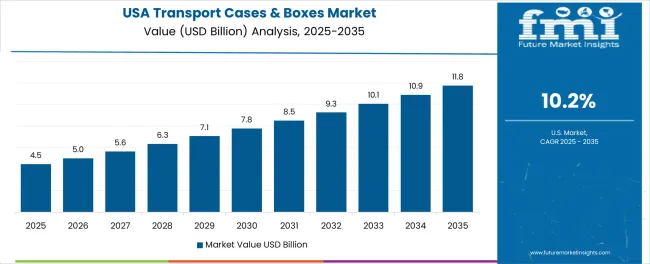
Revenue from transport cases & boxes consumption and sales in the USA is projected to exhibit exceptional growth with a CAGR of 10.2% through 2035, driven by the country's rapidly expanding professional equipment sector, favorable industrial attitudes toward protective solutions, and initiatives promoting equipment safety optimization across major industrial regions. The USA's position as a leading professional market and increasing focus on equipment protection development are creating substantial demand for high-quality transport cases in both commercial and industrial markets. Major equipment suppliers and specialty protective packaging providers are establishing comprehensive distribution capabilities to serve growing professional demand and emerging safety opportunities.
Demand for transport cases & boxes products in Germany is expanding at a CAGR of 9.8%, supported by rising manufacturing sophistication, growing industrial precision, and expanding equipment protection infrastructure. The country's developing industrial capabilities and increasing professional investment in quality equipment are driving demand for transport cases across both imported and domestically produced applications. International equipment companies and domestic manufacturers are establishing comprehensive distribution networks to address growing market demand for quality transport cases and protective packaging solutions.
Revenue from transport cases & boxes products in the UK is expected to grow at a CAGR of 9.5% through 2035, supported by the country's mature professional equipment market, established safety culture, and leadership in quality standards. Britain's sophisticated industrial infrastructure and strong support for equipment protection are creating steady demand for both traditional and innovative transport case varieties. Leading equipment suppliers and specialty protective packaging providers are establishing comprehensive operational strategies to serve both domestic markets and growing export opportunities.
The sale of transport cases & boxes products in China is projected to expand at a CAGR of 11.8% through 2035, driven by the country's emphasis on industrial expansion, manufacturing leadership, and sophisticated production capabilities for equipment requiring specialized protective varieties. Chinese manufacturers and distributors consistently seek professional-grade products that enhance equipment protection and support industrial operations for both traditional and innovative manufacturing applications. The country's position as an Asian manufacturing leader continues to drive innovation in specialty transport case applications and professional product standards.
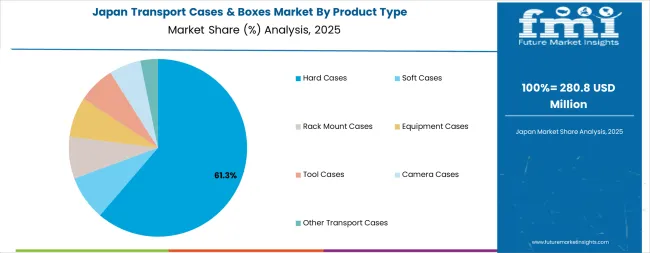
Revenue from transport cases & boxes products in Japan is anticipated to grow at a CAGR of 9.2% through 2035, supported by the country's emphasis on quality manufacturing, equipment safety standards, and advanced technology integration requiring efficient protective solutions. Japanese professionals and equipment handlers prioritize quality performance and precision protection, making transport cases essential components for both traditional and modern industrial applications. The country's comprehensive manufacturing excellence and advancing industrial patterns support continued market expansion.
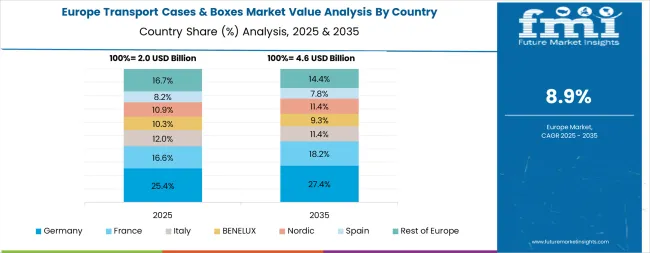
The Europe transport cases & boxes market is projected to grow from USD 2.8 billion in 2025 to USD 6.4 billion by 2035, recording a CAGR of 8.6% over the forecast period. Germany leads the region with a 32.0% share in 2025, moderating slightly to 31.5% by 2035, supported by its strong manufacturing culture and demand for premium, professionally engineered transport cases. The United Kingdom follows with 24.0% in 2025, easing to 23.5% by 2035, driven by a sophisticated professional market and emphasis on quality and safety standards. France accounts for 18.5% in 2025, rising to 19.0% by 2035, reflecting steady adoption of protective equipment solutions and industrial consciousness. Italy holds 11.0% in 2025, expanding to 11.8% by 2035 as industrial modernization and specialty equipment applications grow. Spain contributes 7.5% in 2025, growing to 8.0% by 2035, supported by expanding manufacturing and professional equipment handling. The Nordic countries rise from 5.0% in 2025 to 5.5% by 2035 on the back of strong quality adoption and advanced industrial integration. BENELUX remains a stable 2.0% share across both 2025 and 2035, reflecting mature, premium-focused markets.
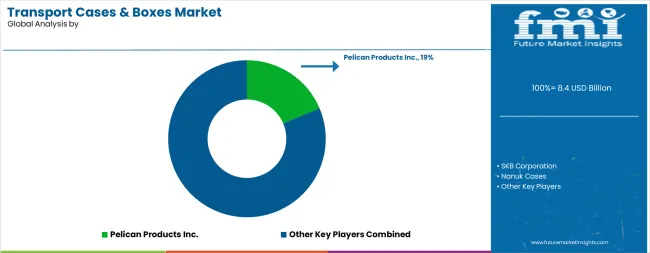
The transport cases & boxes market is characterized by competition among established protective packaging companies, specialized case manufacturers, and integrated protection solution providers. Companies are investing in material technologies, advanced engineering systems, product innovation capabilities, and comprehensive distribution networks to deliver consistent, high-quality, and durable transport cases. Innovation in protection enhancement, lightweight production methods, and application-specific product development is central to strengthening market position and customer satisfaction.
Pelican Products Inc. leads the market with a strong focus on protective innovation and comprehensive hard case solutions, offering premium transport cases with emphasis on durability excellence and protection heritage. SKB Corporation provides specialized case manufacturing capabilities with a focus on North American market applications and custom design networks. Nanuk Cases delivers integrated protective solutions with a focus on quality positioning and operational efficiency. Storm Cases specializes in comprehensive protective packaging with an emphasis on professional applications. Underwater Kinetics focuses on comprehensive industrial solutions with advanced engineering and premium positioning capabilities.
The success of transport cases in meeting professional protection demands, equipment-driven safety requirements, and quality assurance integration will not only enhance protective outcomes but also strengthen global industrial capabilities. It will consolidate emerging regions' positions as hubs for efficient case manufacturing and align advanced economies with professional equipment protection systems. This calls for a concerted effort by all stakeholders -- governments, industry bodies, suppliers, distributors, and investors. Each can be a crucial enabler in preparing the market for its next phase of growth.
How Governments Could Spur Local Production and Adoption?
How Industry Bodies Could Support Market Development?
How Distributors and Industrial Equipment Players Could Strengthen the Ecosystem?
How Suppliers Could Navigate the Shift?
| Items | Values |
|---|---|
| Quantitative Units (2025) | USD 8.4 billion |
| Product Type | Hard Cases, Soft Cases, Rack Mount Cases, Equipment Cases, Tool Cases, Camera Cases, Other Transport Cases |
| Material Type | Plastic, Aluminum, Composite Materials |
| End-Use Industry | Military & Defense, Aerospace, Medical, Photography & Videography, Industrial, Other Industries |
| Regions Covered | North America, Europe, Asia Pacific, Latin America, Middle East & Africa, Other Regions |
| Countries Covered | United States, Germany, United Kingdom, China, Japan, and 40+ countries |
| Key Companies Profiled | Pelican Products Inc., SKB Corporation, Nanuk Cases, Storm Cases, Underwater Kinetics, and other leading transport case companies |
| Additional Attributes | Dollar sales by product type, material type, end-use industry, and region; regional demand trends, competitive landscape, technological advancements in materials engineering, protective design integration initiatives, quality enhancement programs, and premium product development strategies |
The global transport cases & boxes market is estimated to be valued at USD 8.4 billion in 2025.
The market size for the transport cases & boxes market is projected to reach USD 22.8 billion by 2035.
The transport cases & boxes market is expected to grow at a 10.5% CAGR between 2025 and 2035.
The key product types in transport cases & boxes market are hard cases, soft cases, rack mount cases, equipment cases, tool cases, camera cases and other transport cases.
In terms of end-use industry, military & defense segment to command 41.0% share in the transport cases & boxes market in 2025.






Our Research Products

The "Full Research Suite" delivers actionable market intel, deep dives on markets or technologies, so clients act faster, cut risk, and unlock growth.

The Leaderboard benchmarks and ranks top vendors, classifying them as Established Leaders, Leading Challengers, or Disruptors & Challengers.

Locates where complements amplify value and substitutes erode it, forecasting net impact by horizon

We deliver granular, decision-grade intel: market sizing, 5-year forecasts, pricing, adoption, usage, revenue, and operational KPIs—plus competitor tracking, regulation, and value chains—across 60 countries broadly.

Spot the shifts before they hit your P&L. We track inflection points, adoption curves, pricing moves, and ecosystem plays to show where demand is heading, why it is changing, and what to do next across high-growth markets and disruptive tech

Real-time reads of user behavior. We track shifting priorities, perceptions of today’s and next-gen services, and provider experience, then pace how fast tech moves from trial to adoption, blending buyer, consumer, and channel inputs with social signals (#WhySwitch, #UX).

Partner with our analyst team to build a custom report designed around your business priorities. From analysing market trends to assessing competitors or crafting bespoke datasets, we tailor insights to your needs.
Supplier Intelligence
Discovery & Profiling
Capacity & Footprint
Performance & Risk
Compliance & Governance
Commercial Readiness
Who Supplies Whom
Scorecards & Shortlists
Playbooks & Docs
Category Intelligence
Definition & Scope
Demand & Use Cases
Cost Drivers
Market Structure
Supply Chain Map
Trade & Policy
Operating Norms
Deliverables
Buyer Intelligence
Account Basics
Spend & Scope
Procurement Model
Vendor Requirements
Terms & Policies
Entry Strategy
Pain Points & Triggers
Outputs
Pricing Analysis
Benchmarks
Trends
Should-Cost
Indexation
Landed Cost
Commercial Terms
Deliverables
Brand Analysis
Positioning & Value Prop
Share & Presence
Customer Evidence
Go-to-Market
Digital & Reputation
Compliance & Trust
KPIs & Gaps
Outputs
Full Research Suite comprises of:
Market outlook & trends analysis
Interviews & case studies
Strategic recommendations
Vendor profiles & capabilities analysis
5-year forecasts
8 regions and 60+ country-level data splits
Market segment data splits
12 months of continuous data updates
DELIVERED AS:
PDF EXCEL ONLINE
Market Share Distribution Among Transport Cases & Boxes Providers
Transportation and Security System Market Size and Share Forecast Outlook 2025 to 2035
Transport Management System Market Size and Share Forecast Outlook 2025 to 2035
Transportation Biofuel Market Size and Share Forecast Outlook 2025 to 2035
Transportation Infrastructure Construction Market Size and Share Forecast Outlook 2025 to 2035
Transportation Aggregators Market Size and Share Forecast Outlook 2025 to 2035
Transport Fuel Cell Market Size and Share Forecast Outlook 2025 to 2035
Transportation Based Hydrogen Energy Storage Market Size and Share Forecast Outlook 2025 to 2035
Transportation Analytics Market Analysis - Size, Share, and Forecast Outlook 2025 to 2035
Transport Protein Assays Kits Market Trends - Industry Forecast 2025 to 2035
Transportation Condensing Units Market Growth – Trends & Forecast 2025 to 2035
Transport Packaging Market from 2025 to 2035
Transportation Composites Market Growth – Trends & Forecast 2022 to 2032
Transportable Ventilator Market
Transportation Coating Market Analysis 2022 to 2032
Transportation Predictive Analytics Market Report – Growth & Forecast 2017-2027
MRI Transport Market Size and Share Forecast Outlook 2025 to 2035
Ice Boxes Market Size and Share Forecast Outlook 2025 to 2035
Cryoboxes Market Size and Share Forecast Outlook 2025 to 2035
Slipcases Market Size and Share Forecast Outlook 2025 to 2035

Thank you!
You will receive an email from our Business Development Manager. Please be sure to check your SPAM/JUNK folder too.
Chat With
MaRIA